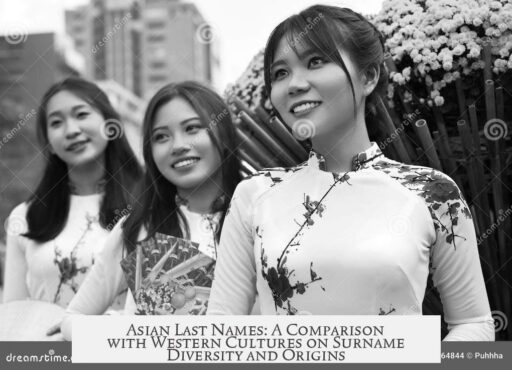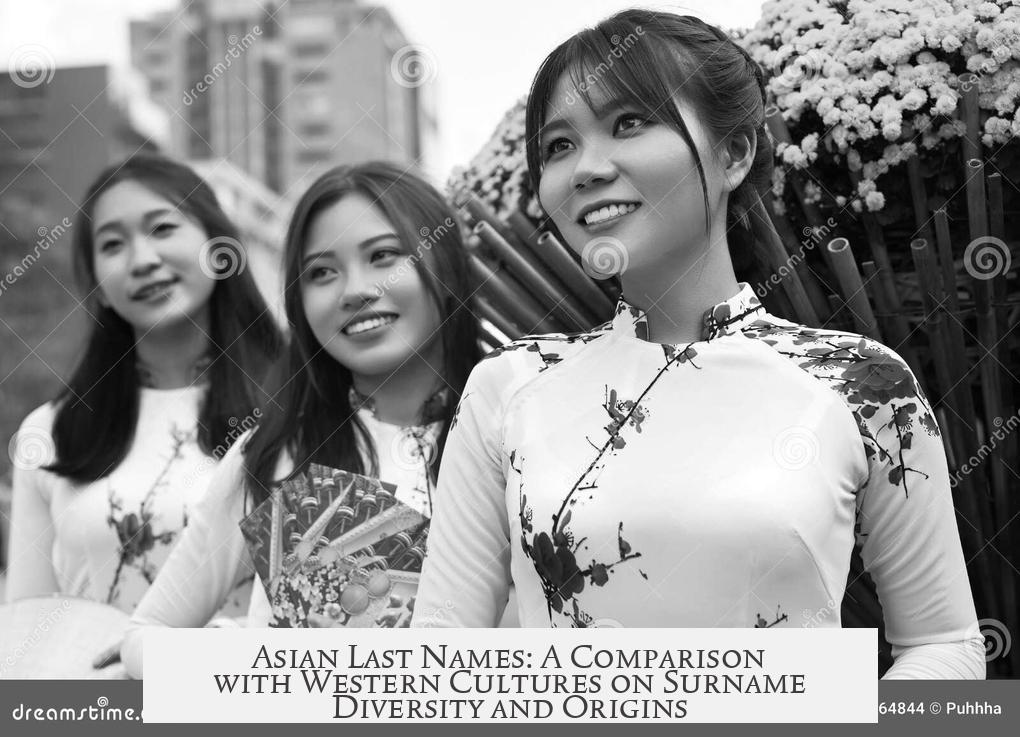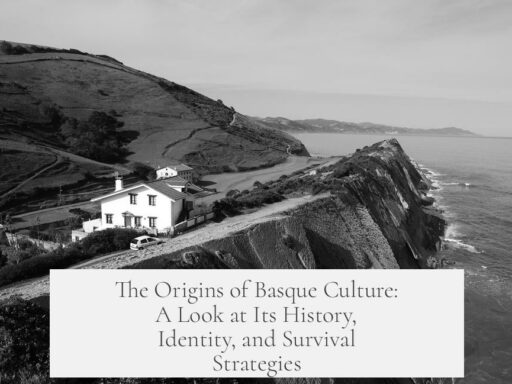Asian cultures such as Chinese, Vietnamese, and Korean appear to have fewer last names because a small number of surnames dominate large populations, but this perception is misleading. These cultures actually possess hundreds to thousands of surnames, yet a handful cover the majority of people.
In China, for example, research shows over 900 distinct surnames exist, with historical records accumulating many more. However, surnames like Wang, Li, and Zhang represent a significant share of the population. Similarly, Korea has a few extremely common surnames such as Kim, Lee, and Park, but official registries report around 6000 surnames today. Vietnam’s situation differs slightly; a few surnames such as Nguyễn, Trần, and Lê dominate relative to the population. Nguyễn alone covers over 38% of Vietnamese people.
This distribution arises from several factors:
- State Influence and Dynastic Control: In Chinese and Vietnamese history, surnames have often been linked to loyalty or affiliation with ruling dynasties. For instance, in 1232, the Trần dynasty forced people to adopt certain surnames to diminish rivals’ influence. Political motives have shaped, consolidated, or shifted surname usage over centuries.
- Historical Depth and Stable Lineages: Asian cultures formalized family lineages and surnames thousands of years ago. The Song dynasty in China (1200s) recorded detailed family histories. In contrast, European surnames frequently became inheritable only in the past several centuries, leading to more fluctuation and variability.
- Cultural and Linguistic Unity: Asian surnames derive largely from Sinitic roots and clan systems. This common origin limits surname diversity compared with Western countries, where multiple languages, ethnic groups, and traditions coexist.
Western cultures, especially in Europe and immigrant-rich countries like the United States, show far greater surname diversity for other reasons:
- Multiethnic Immigration: Thousands of surnames arrived through immigration, covering various languages and naming traditions. This creates a vast range of family names.
- Origins from Occupation and Geography: Many European surnames developed from professions (e.g., Smith, Miller), place names, or personal characteristics. These naming conventions generated a broader surname spectrum.
- Recent Surname Stabilization: Surnames in parts of Europe standardized only in the last few hundred years. For example, the Netherlands formalized surnames quite recently, allowing a proliferation of unique names.
- Name Changes on Immigration: Immigrants often altered their surnames to assimilate or simplify them, creating new variants and contributing to surname numbers.
Some comparative data illustrates these trends clearly:
| Country | Approximate Number of Surnames |
|---|---|
| China | ~926 |
| Korea | ~274 |
| Vietnam | ~200-300 (estimates vary) |
| England | ~16,000 |
| Japan | ~100,000+ |
Thus, the perception of Asian surname scarcity reflects the concentration of populations under a few family names rather than an actual limited pool of surnames. Their historical, political, and cultural frameworks encourage lineage consolidation. Western surname diversity emerges from recent developments, occupational and geographic inspirations, and immigration-driven multilingualism.
Key points to remember:
- Asian populations often share a few very common surnames, but many surnames exist beyond these major groups.
- Surname traditions in Asia often trace back thousands of years, with state-driven surname assignment and clan cohesion.
- Western surname diversity results from multiple linguistic origins, occupational and locational influences, and immigrant name changes.
- Historical, political, and cultural factors shaped surname use very differently across Asia and the West.
- Vietnamese surnames notably reflect dynastic history and political surname changes focused on clan identity.
Why Do Asian Cultures (Mostly Chinese, Vietnamese, and Korean) Have So Few Last Names, While Many Western Cultures Have So Many?

Asian cultures don’t truly have “few” last names; instead, a handful of surnames cover a large chunk of the population. It’s a twist that surprises many, but dive into the history and culture, and the picture becomes clearer. So, why do a ton of people in China, Vietnam, and Korea seem to share just a handful of last names, while Europe and America boast tens of thousands? Let’s unpack this surname mystery.
Imagine being at a big family reunion where half the crowd shares the same surname. That’s closer to reality in the Sinosphere—China, Vietnam, and Korea—than in much of the West. But it’s not because Asian cultures lack surnames; quite the contrary. A decade ago, a surname collector stopped at nearly a thousand Chinese last names—because the list just kept growing!
Common Misconception: Asian Cultures Have Few Last Names

It’s easy to think Asian people have “few” last names. But that’s just the surface. Those few common names like Li, Nguyễn, or Kim get repeated so often they seem to overshadow the rest. The truth? Many surnames exist—just very concentrated in usage.
For example, China alone has more than 900 surnames. Korea has around 274 recognized names, and Vietnam’s count is trickier to pin down but ranges between about 190 and 300. Meanwhile, England’s surnames tally at roughly 16,000, and Japan astoundingly leads with about 100,000. So, Asian nations certainly don’t “run out” of surnames—they often just stick with a smaller pool in daily use.
Origins of Asian Surnames: A Limited but Historic Source
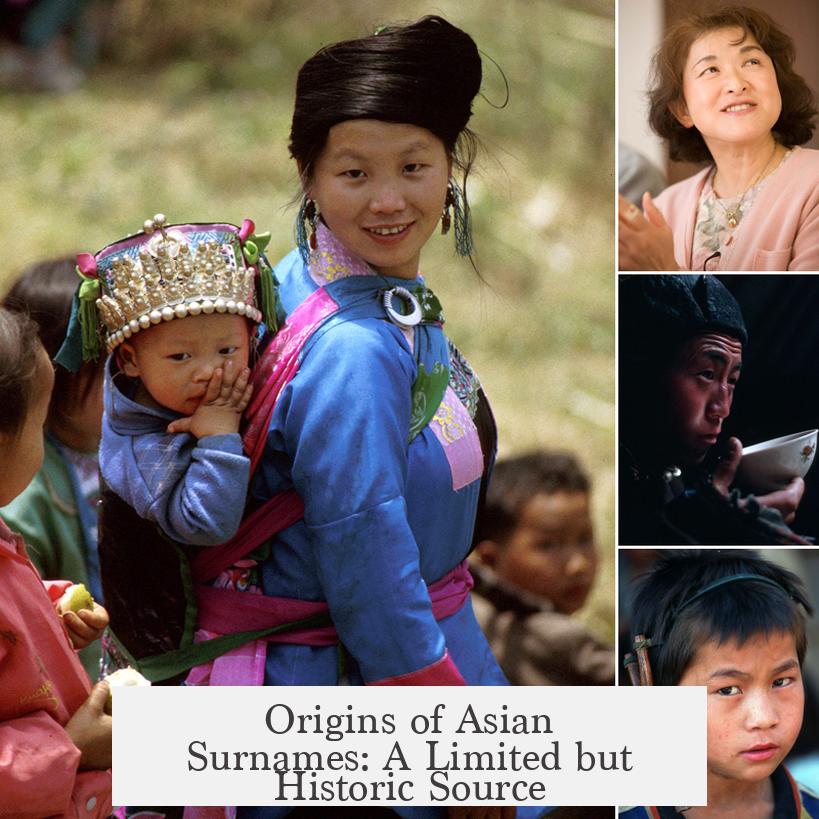
Here’s one key: comparison with Western surname variety isn’t apples to apples. Western countries, especially immigrant-rich ones like the US and much of Europe, have names originating from many linguistic roots. Immigrants from across the globe bring their surnames, adding new ones continuously.
Asian surnames, especially in the Sinosphere, largely stem from one cultural root: Sinitic traditions. The dynasty-driven states and Confucian lineage systems shaped the surname landscape, sticking mostly to names rooted in ancient Chinese characters and clan names.
Historically, many Asian surnames arose from formal state adoption or shifts in allegiance. For instance, in imperial China, families would take surnames either granted by the government or to express loyalty to the ruling dynasty. Surnames changed over time, often for political reasons—a contrast to Western surnames, which sprung from a mix of occupations, places, or even nicknames, often much later in history.
Family Lineage Matters: Asian Families Took Names Seriously

Another twist: in Asia, family lineage has been taken seriously for centuries, dating back to the Song dynasty (1200s). They kept genealogical records long before many European traditions solidified. In Europe, many surnames only standardized in the last few centuries. This long history helped cement a core group of surnames passed down reliably, making the familiar handful even more dominant.
“In China, family lineages started being taken incredibly seriously way back in the Song period. A lot of European surnames are much more recent than that!”
Vietnam’s Surnames: Dynasties, Politics, and Clan Mentality
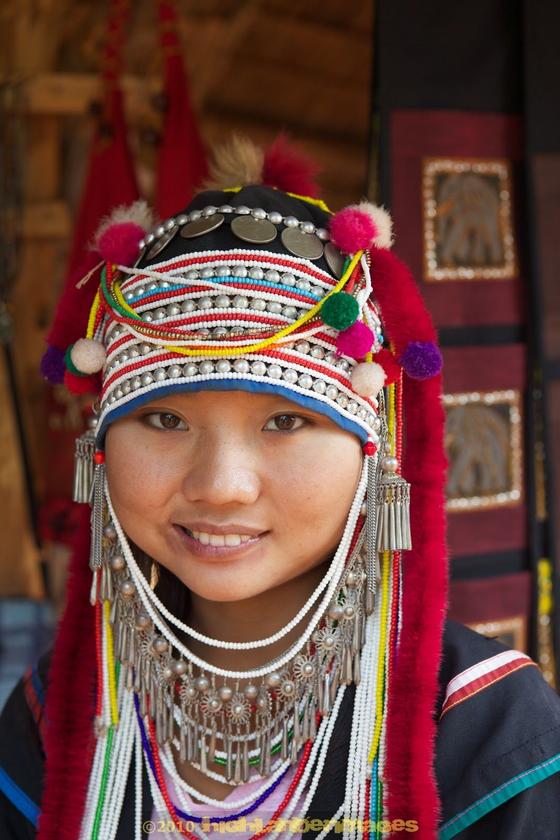
Vietnam’s surname story is especially fascinating. Despite having around 200-300 surnames, the population is mostly concentrated in just a few. About 38% of Vietnamese bear the surname Nguyễn. Another 11% go by Trần, and 9.5% by Lê. This clustering reflects Vietnam’s dynastic past heavily intertwined with Chinese imperial influence.
Political shifts often forced surname changes. Philippine dynasties shaped naming practices, sometimes using surname changes to erase former dynastic influence or punish dissenters. In 1232, the Trần prince Thủ Độ made a strong push to replace the Lý dynasty’s influence by forcing surname adoption, punishing those who resisted. Later, Emperor Hồ Quý Ly ordered his family to take the Nguyễn name.
This pattern continued—falling dynasties’ members adopted dominant surnames for safety or assimilation. In fact, criminals sometimes changed surnames in the 1800s to dodge the law. This mix of political power plays, dynastic loyalty, and clan identity explains why a few surnames dominate Vietnam today.
Korea’s Mix of Surnames: Traditional Roots and Varied Numbers
Korea offers an interesting balance. Most Korean surnames link back to Chinese characters, reflecting the historical influence of Chinese culture. However, Korea registers approximately 6,000 surnames today, with usage spanning from very common ones like Kim (金) to rarer clan names such as Namgung (南宫). Still, a few big surnames dominate Korean population, much like in China and Vietnam.
Interestingly, about 75% of Korean surnames today aren’t strictly Sinitic in origin—highlighting some diversification. But their historical core remains distinctly tied to Chinese roots and the hierarchical clan system.
Chinese Surnames: Endless Variety Hidden Behind Familiarity
China’s surname diversity reaches deep roots. The sheer number of Chinese surnames is hard to pin down precisely, but sources estimate nearly 1,000 active names. Historically, surnames evolved through migrations, regime changes, and clan splits.
Despite common names like Wang (王), Li (李), and Zhang (张) dominating the population, plenty of lesser-known surnames exist. This rich lineage will keep genealogists busy for a long time.
The Western Contrast: Immigration, Variety, and Recency
Why does the West seemingly have so many last names? The answer lies in the multicultural makeup and history of immigration. Europe and the Americas are melting pots. People from diverse backgrounds, languages, and regions converged with different last names not just centuries ago, but recently. This steady influx keeps expanding surname lists.
Another key: Western surnames often have origins in occupations, geographic locations, physical traits, or nicknames. Names like Smith, Hill, or Short directly reflect a broad range of inspirations.
Plus, some Western regions only standardized surnames recently. For example, the Netherlands required fixed surnames only a few centuries ago, allowing a burst of new name registrations. When immigrants arrived in countries like the US, many even changed names, creating new variants or simplifications to fit in—fanning the diversity flame even more.
Summary of Surname Differences: History, Politics, and Demographics
- Asian surnames are numerous but concentrated: Though thousands exist, a few dominate large populations due to dynastic, political, and cultural lineage traditions.
- Western surnames are varied and recent: Immigration, occupation-based names, and geography produce an explosion of surname diversity.
- Political control shaped Asian surnames: In many Asian societies, surnames changed not organically but through political influence—forcing loyalty or erasing past dynasties.
- Long lineage records in Asia: Asian societies have passed down family names with great care for centuries, unlike Europe, where many surnames appeared or stabilized just a few hundred years ago.
So, What’s the Takeaway?
Seeing a sea of Nguyễn or Kim might make it seem like Asian last names are rare. But it reveals something deeper—one where history, culture, and politics tightly weave family identity. Western surname diversity tells a different story: a kaleidoscope influenced by immigration, professions, land, and recent standardizations.
Next time you meet someone with a commonly shared Asian last name, remember there’s a rich narrative behind it. Those names link vast clans, ancient dynasties, political shifts, and centuries of family pride.
And just perhaps, the surname saturation is less about “few names” and more about thousands of stories behind a single name’s popularity.
Want To Explore Your Surname? Here’s a Quick Tip:
- Start by looking into historical records—family genealogies in Asia often trace back hundreds of years.
- For Western names, check regions your ancestors came from to understand occupational or locational roots.
- Use online databases to uncover surname distribution globally—sometimes surprise awaits at the borders.
So, why do Asian cultures mostly share few last names compared to the numerous ones in the West? It boils down to historical lineage respect, political forces, and a more unified naming tradition, versus immigration mélange, recent naming standardizations, and occupational/locational inspiration in the West.
